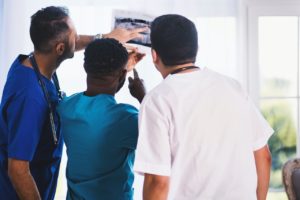Because we track locally-driven innovations in health-tech across the African continent, we curate a monthly newsletter to share our most “salient” learnings in more real time. We welcome submissions and suggestions. | January 2024
Reviewing Salient Advisory’s work in 2023
In 2023, we deepened our work around developing insightful market intelligence on African healthtech ecosystems and convening partnerships to accelerate innovators’ scale and impact.
In January, we convened a Regulatory Learning Group (RLG) of pharmacy practice regulators from 13 African countries to assess online pharmacy regulations in these countries, and identify opportunities to catalyze new regulations, or advance existing ones. In total, four learning group sessions were convened between January and August. This work culminated in a public-facing report highlighting the status of regulatory frameworks that enable direct-to-consumer access to essential health commodities, including contraceptives, via online pharmacies across 15 African countries and four Asian comparator countries.
In April we launched applications for the second cohort of the Investing in Innovation (i3) program, an initiative providing African health supply chain innovators with risk-tolerant capital and support to catalyze partnerships with industry, government and donors. We also published high-level analysis of funding trends in African healthtech ecosystems in 2022, presenting insights on categories of interest to investors and gender financing gaps.
In July, we published Innovations in Digitizing Health Supply Chains in Africa, the first pan-African landscape assessment of health supply chain innovators on the continent. The report tracked nearly 350 technology-enabled innovators digitizing supply chain processes across 27 African countries.
In September, the i3 program also selected 29 promising early to growth-stage innovators to participate in its second cohort. The selected startups, from across 21 African countries, received $50,000 in grants and access to market support to catalyze partnerships with donors. 60 innovators have now been supported through the program in the last 18 months.
Still in September, we released Digitized Supply Chains & Contraceptive Care: Opportunities for Expanding Access in Africa, a report offering insights into the landscape of healthcare supply chain innovators enabling access to contraceptive care services and products across 27 African countries. The report featured 116 health supply chain innovators and highlighted opportunities for enhancing regulatory frameworks and expanding innovators’ contraceptive product mix.
Finally in November, we released “Landscape of Digital Infrastructure and Solutions: A Rapid Assessment for Lagos State Ministry of Health” a report examining the state of digital readiness across health facilities in Lagos, Nigeria, presenting findings on existing infrastructure gaps hindering the adoption of digital health solutions, and identifying opportunities for focused intervention to rapidly improve digital health readiness.
We also hosted the second edition of Access to Markets, i3’s flagship event, which brought governments, industry, donors and innovators together to explore partnerships. Held in Nairobi, Kenya, the event successfully gathered over 120 attendees and enabled more than 182 partnership-focused meetings between startups and partners.
Through the year, our research and work also featured in 50+ global and pan-African media outlets including Al Jazeera, TechCrunch, CNBC Africa, AriseTV, Disrupt Africa, Inc.Africa, among others, further establishing our thought leadership in relevant circles.
We look forward to doing more in 2024.
Development partners and finance institutions are supporting innovators with funding and working capital loans
The United Nations Development Programme and eight African countries (Rwanda, Morocco, Senegal, Nigeria, Ghana, South Africa, Kenya, and Egypt) are collaborating on timbuktoo innovation fund, an ambitious initiative to invest $1 billion to support 1,000 African tech startups over the next decade. While the fund will have a broad multi-sector focus, a healthtech-focused hub will be based in Kigali, with the goal of identifying, investing and support the continent’s most promising healthtech innovators with the potential to shape health systems across the continent.
The African Development Bank Group is also working with HealthTech Hub Africa, a healthtech accelerator in Rwanda, to develop a pan-African blueprint aimed at accelerating health tech innovations and addressing health infrastructure gaps. The collaboration is seeking to empower healthtech innovators and enhance their capabilities, especially those focusing on patient-centric telemedicine, data sharing, patient record tracking, and AI-powered diagnostic tools.
In Kenya, a new partnership between M-Tiba, the Medical Credit Fund, and MYDAWA is deepening the pool of working capital support available to pharmacies and hospitals with a $240,000 credit facility. The collaboration will offer increased access to working capital loans for healthcare providers (particularly in underserved areas), ensuring continued access to a consistent supply of medicines and health products.
Innovators kick-off 2024 with investment to drive expansion
Yodawy, an Egyptian healthtech startup, raised $10 million in equity funding from Ezdehar to support its growth and expansion plans. Founded in 2018, Yodawy offers online pharmacy solutions, allowing users order and receive medicines, allowing physicians facilitate prescriptions for patients and allowing insurance companies source and provide medication to their subscribers. Yodawy’s latest funding follows a $16 million Series B round raised in February last year.
In Côte d’Ivoire, Lapaire, an eyecare startup raised $3 million in funding to expand its services across Africa. Participating investors in the round included Investisseurs & Partenaires, AAIC, FINCA Ventures, and Beyond Capital. Having already established operations in six African countries, Lapaire could now be set for even further expansion.
In Tanzania, Dawa Mkononi, a health supply chain startup, raised an undisclosed funding round from investors, including Sanofi Global Health Unit Impact Fund, Pontem Ventures, and Axian Group. Dawa Mkononi enables pharmacies, hospitals, clinics, and drug shops across the country restock inventory through a digital marketplace that connects them to verified distributors. The company’s solution ensures healthcare providers maintain consistent access to quality health products, avoiding an open drug market and the accompanied risk of fake or substandard products.
Recommended Read
Ghana’s National Electronic Pharmacy Platform is an ambitious example of government-led innovation that can transform digitization in the health sector. In this technical brief, we present insights on Ghana’s innovative approach and, more importantly, how it can serve as a model for other African countries.
Spread the word! Share this with African health-tech innovators, donors, investors, and enthusiasts within your network – and tell them to sign up!


